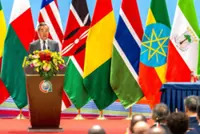KUALA LUMPUR: Moody's Investors Service says that China's (A1 stable) Belt and Road Initiative (BRI) -- through investments in large transportation and energy projects -- helps to expand productive capacity by closing critical infrastructure gaps.
BRI investments contribute to both near-term economic growth and long-run growth potential in recipient countries, it said in a report on Thursday.
"However, inefficient project implementation, and the absence of macroeconomic and structural reform requirements in many Chinese loans can lessen longer-term credit benefits for some sovereigns," according to William Foster, a Moody's vice president and senior credit officer.
"Meanwhile, the scale and terms of BRI investment can amplify macro-stability risks for sovereigns with weaker economic fundamentals and limited policy effectiveness," Foster said.
In a new report, Moody's focuses on the potential long-run economic gains and near- to medium-term macro-stability risks for 12 emerging and frontier countries in South Asia, Southeast Asia and Central Asia/CIS.
The countries are Pakistan (B3 negative), Sri Lanka (B2 stable), the Maldives (B2 negative), Cambodia (B2 stable), Vietnam (Ba3 stable), Thailand (Baa1 stable), Malaysia (A3 stable), Mongolia (B3 stable), Kazakhstan (Baa3 stable), Tajikistan (B3 negative), the Kyrgyz Republic (B2 stable), and Georgia (Ba2 stable).
Among these countries, Moody's sees Pakistan, Mongolia, Kazakhstan and Cambodia as reaping the greatest potential for economic gains.
Moody's notes that bilateral lending from China comprises much of the financing for BRI projects and the scale – relative to the size of the host economy, the terms of lending, and the recipient, whether a government or private sector entity – varies considerably among sovereigns.
For countries with weaker fiscal and external positions and large volumes of non-concessional funding, BRI project financing tends to exacerbate debt sustainability and balance of payments pressures.
In this context, Moody's sees the Maldives, Pakistan and Sri Lanka as the sovereigns at greatest risk from rising debt and widening external imbalances in part related to the BRI.
Conversely, Kazakhstan, Vietnam and Thailand are not significantly exposed to potential BRI-related macro-stability risks, due to generally stronger sovereign credit profiles or the smaller relative scale of their projects.





